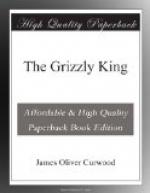And then, while the storm still moaned far up over their heads, Roscoe Cummins listened to the old, old story of the First People—the story of starvation and of death. To him it was epic. It was terrible. But to the other it was the mere coming and going of a natural thing, of a thing that had existed for him and for his kind since life began, and he spoke of it quietly and without a gesture. There had been a camp of twenty-two, and there were now fifteen. Seven had died, four men, two women, and one child. Each day during the great storm the men had gone out on their futile search for game, and every few days one of them had failed to return. Thus four had died. The dogs were eaten. Corn and fish were gone; there remained but a little flour, and this was for the women and the children. The men had eaten nothing but bark and roots for five days. And there seemed to be no hope. It was death to stray far from the camp. That morning the two men had set out for the post, but Mukoki said calmly that they would never return. And then Roscoe spoke of Oachi, his daughter, and for the first time the iron lines of the chief’s bronze face seemed to soften, and his head bent over a little, and his shoulders drooped. Not until then did Roscoe learn the depths of sorrow hidden behind the splendid strength of the starving man. Oachi’s mother had been a French woman. Six months before she had died in this tepee, and Mukoki had buried his wife up on the face of the mountain, where the storm was moaning. After this Roscoe could not speak. He was choking. He loaded his pipe again, and sat down close to the chief, so that their knees and their shoulders touched, and thus, as taught him by old Rameses, he smoked with Oachi’s father the pledge of eternal friendship, of brotherhood in life, of spirit communion in the Valley of Silent Men. After that Mukoki left him and he crawled back upon his bunk, weak and filled with pain, knowing that he was facing death with the others. He was not afraid, but was filled with a great thankfulness that, even at the price of starvation, fate had allowed him to touch at last the edge of the fabric of his dreams. All of that day he wrote, in the hours when he felt best. He filled page after page of the tablets which he carried in his pack, writing feverishly and with great haste, oppressed only by the fear that he would not be able to finish the message which he had for the people of that other world a thousand miles away. Three times during the morning Oachi came in and brought him the cooked fish and a biscuit which she had made for him out of flour and meal. And each time he said, “I am a man with the other men, Oachi. I would be a woman if I ate.”
The third time Oachi knelt close down at his side, and when he refused the food again there came a strange light into her eyes, and she said, “If you starve—I starve!”




